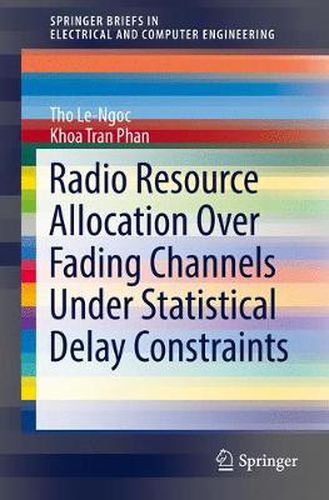Readings Newsletter
Become a Readings Member to make your shopping experience even easier.
Sign in or sign up for free!
You’re not far away from qualifying for FREE standard shipping within Australia
You’ve qualified for FREE standard shipping within Australia
The cart is loading…






This title is printed to order. This book may have been self-published. If so, we cannot guarantee the quality of the content. In the main most books will have gone through the editing process however some may not. We therefore suggest that you be aware of this before ordering this book. If in doubt check either the author or publisher’s details as we are unable to accept any returns unless they are faulty. Please contact us if you have any questions.
This SpringerBrief presents radio resource allocation schemes for buffer-aided communications systems over fading channels under statistical delay constraints in terms of upper-bounded average delay or delay-outage probability.
This Brief starts by considering a source-destination communications link with data arriving at the source transmission buffer. The first scenario, the joint optimal data admission control and power allocation problem for throughput maximization is considered, where the source is assumed to have a maximum power and an average delay constraints. The second scenario, optimal power allocation problems for energy harvesting (EH) communications systems under average delay or delay-outage constraints are explored, where the EH source harvests random amounts of energy from renewable energy sources, and stores the harvested energy in a battery during data transmission. Online resource allocation algorithms are developed when the statistical knowledge of the random channel fading, data arrivals, EH processes governing the system dynamics is unknown a-priori.
This Brief continues with a source-relay-destination communications link with buffers available at both source and relay, as part of a multi-hop network. Optimal resource allocation schemes for this 3-node relaying system to maximize its effective capacity under a delay-outage constraint are proposed, with special emphasis on relay roles: Half-duplex (HD) or full-duplex (FD) relay operation. With HD relay, the adaptive link selection relaying problem jointly with both fixed and adaptive power allocation schemes is investigated. Within each transmission frame, either the source-relay link or the relay-destination link is selected to be active depending on the channel conditions. With FD relay under the presence of non-zero residual self-interference (SI).
This Brief also presents source and relay power allocation schemes for both cases of available knowledge of the channel state information at transmitter (CSIT): instantaneous or statistical. Professional and researchers working in this related field and advanced-level students in electrical or computer engineering will find the content valuable as a reference.
$9.00 standard shipping within Australia
FREE standard shipping within Australia for orders over $100.00
Express & International shipping calculated at checkout
This title is printed to order. This book may have been self-published. If so, we cannot guarantee the quality of the content. In the main most books will have gone through the editing process however some may not. We therefore suggest that you be aware of this before ordering this book. If in doubt check either the author or publisher’s details as we are unable to accept any returns unless they are faulty. Please contact us if you have any questions.
This SpringerBrief presents radio resource allocation schemes for buffer-aided communications systems over fading channels under statistical delay constraints in terms of upper-bounded average delay or delay-outage probability.
This Brief starts by considering a source-destination communications link with data arriving at the source transmission buffer. The first scenario, the joint optimal data admission control and power allocation problem for throughput maximization is considered, where the source is assumed to have a maximum power and an average delay constraints. The second scenario, optimal power allocation problems for energy harvesting (EH) communications systems under average delay or delay-outage constraints are explored, where the EH source harvests random amounts of energy from renewable energy sources, and stores the harvested energy in a battery during data transmission. Online resource allocation algorithms are developed when the statistical knowledge of the random channel fading, data arrivals, EH processes governing the system dynamics is unknown a-priori.
This Brief continues with a source-relay-destination communications link with buffers available at both source and relay, as part of a multi-hop network. Optimal resource allocation schemes for this 3-node relaying system to maximize its effective capacity under a delay-outage constraint are proposed, with special emphasis on relay roles: Half-duplex (HD) or full-duplex (FD) relay operation. With HD relay, the adaptive link selection relaying problem jointly with both fixed and adaptive power allocation schemes is investigated. Within each transmission frame, either the source-relay link or the relay-destination link is selected to be active depending on the channel conditions. With FD relay under the presence of non-zero residual self-interference (SI).
This Brief also presents source and relay power allocation schemes for both cases of available knowledge of the channel state information at transmitter (CSIT): instantaneous or statistical. Professional and researchers working in this related field and advanced-level students in electrical or computer engineering will find the content valuable as a reference.